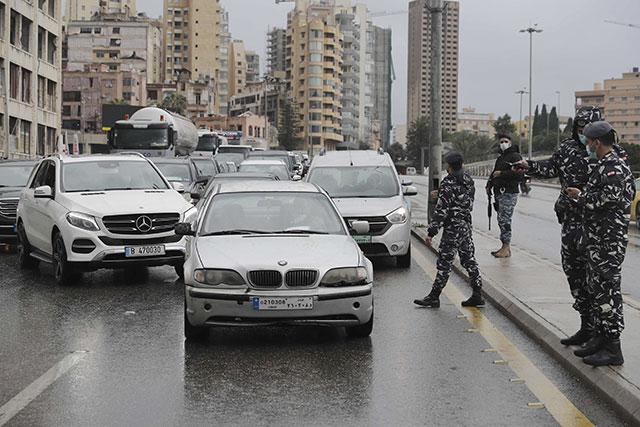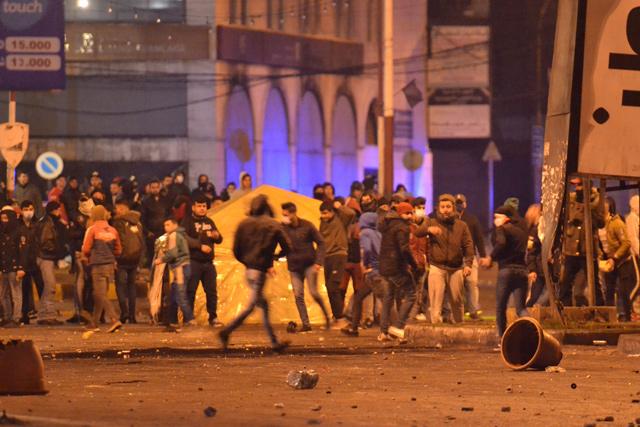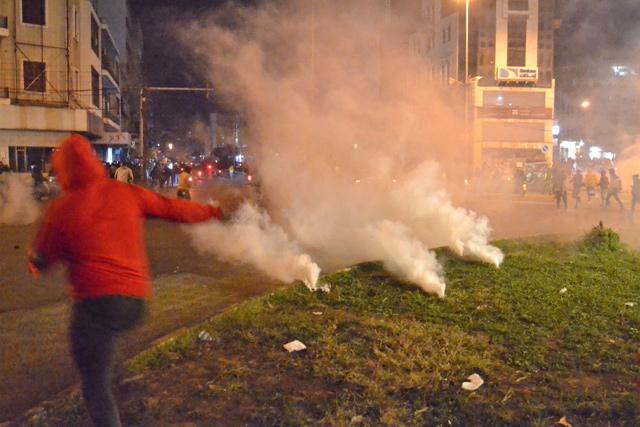You are here
Lebanon enters full lockdown to stem virus uptick
By AFP - Jan 14,2021 - Last updated at Jan 14,2021

Policemen control cars at a checkpoint on the Fuad Shahab bridge known as the 'Ring' in the capital Beirut, as Lebanon enters its first day of strict lockdown imposed by the authorities in a bid to stem the spread of the coronavisus, on Thursday (AFP photo)
BEIRUT — Lebanon went into a tight lockdown on Thursday, with residents barred even from grocery shopping and forced to rely on food deliveries as the country battles to slow spiking novel coronavirus cases.
The new restrictions were only loosely respected in some areas of the country, however, reflecting deep mistrust of a political elite held responsible for a deepening economic crisis.
The lockdown, ordered after some hospitals started to run out of intensive care beds, includes a 24-hour curfew until January 25.
Non-essential workers are barred from leaving their homes, and supermarkets are only allowed to operate by delivery.
Those needing an emergency exemption -- to see a doctor, say -- can request one via a text message or by filling in a form online.
In the capital, roads were quieter than usual, while non-essential shops remained shuttered. Security forces stopped drivers at several checkpoints in the centre of the city.
Security forces said compliance with the new measures stood at 94 per cent.
But in some areas, some people ventured out to buy groceries.
As the lockdown went into force, authorities announced Thursday that 41 people had died of the coronavirus over the previous 24 hours, with 5,196 new infections registered.
Heart attacks
Recent days have seen Lebanon hit record daily Covid-19 caseloads in one of the steepest increases in transmission worldwide.
In Geitawi Hospital in Beirut on Thursday, director Pierre Yared said the emergencies department was brimming over with more than 30 people suffering from Covid-19 the previous day.
"The ER was filled with corona patients, there were no other patients," he said.
Cases skyrocketed after authorities loosened restrictions during the holiday season, allowing restaurants and night clubs to remain open until 3:00 am, despite warnings from health professionals.
A partial lockdown in place since January 7 has failed to halt the spread of the virus.
Firass Abiad, the prominent director of the main state hospital treating Covid patients, warned the latest lockdown must not fail.
"In the last 24 hours alone, four Covid positive patients presented in cardiac arrest to our emergency room," he wrote on Twitter.
"One of them was a 19 years old patient. This is serious."
The new measures came into effect after caretaker health minister Hamad Hasan was admitted to hospital with Covid-19 late Wednesday, state media said.
The announcement on Monday raised fears of food shortages in impoverished and remote regions where deliveries are not readily available.
For several days, Lebanese have flooded supermarkets and chemists to stock up on supplies.
Some are worried the new restrictions will pile additional suffering on the country's poorest.
Political crisis
Lebanon, a country of more than 6 million, was already grappling with its worst economic downturn in decades when the pandemic hit.
Previous lockdowns have forced businesses to close and deprived some, particularly informal day labourers, of income. Around half Lebanon's population lives in poverty.
The World Bank Group on Tuesday approved a $246-million aid package to help 786,000 vulnerable Lebanese, but it is unclear when it will arrive.
Lebanon has recorded 237,132 cases since February last year, including 1,781 deaths.
Parliament is expected to convene Friday to examine a bill to allow the import and use of Covid-19 vaccines, which authorities have previously said will arrive in Lebanon by February.
Coming after months of political crisis and mass anti-government demonstrations, the country's Covid-19 response is being overseen by a caretaker administration.
The previous government had resigned after a massive explosion of ammonium nitrate fertiliser at Beirut port last summer killed 200 people, wounded thousands and ravaged large parts of the capital.
A deeply divided political class has been unable to agree on a new Cabinet to launch urgently needed reforms.
Related Articles
TRIPOLI, Lebanon — Lebanon may be under a strict pandemic lockdown to stem raging coronavirus rates, but father-of-six Omar Qarhani is still
BEIRUT — Overnight clashes in northern Lebanon between security forces and demonstrators angered by a coronavirus lockdown injured at least
BEIRUT — Lebanon has prolonged a total lockdown by two weeks to stem an unprecedented rise in coronavirus cases and protect its collap



















